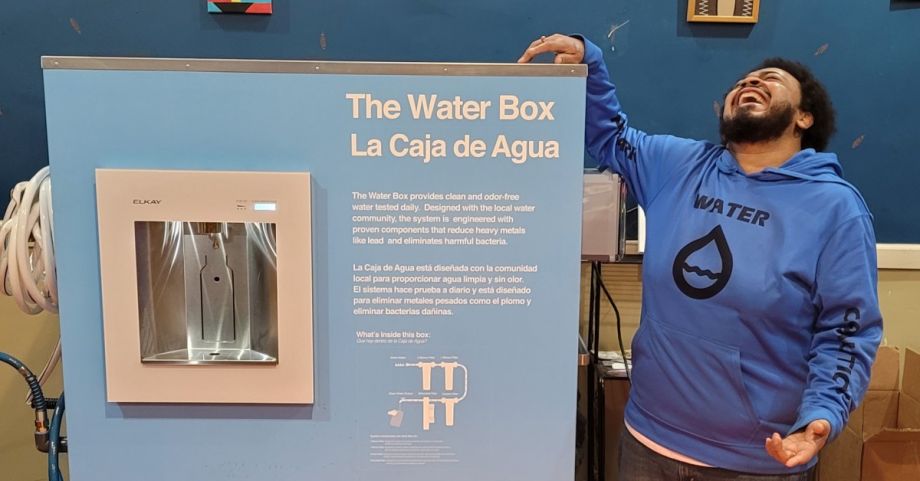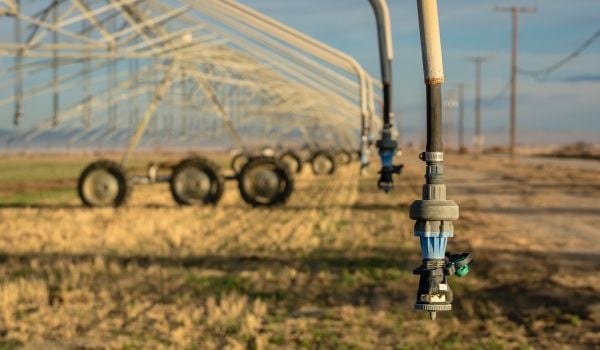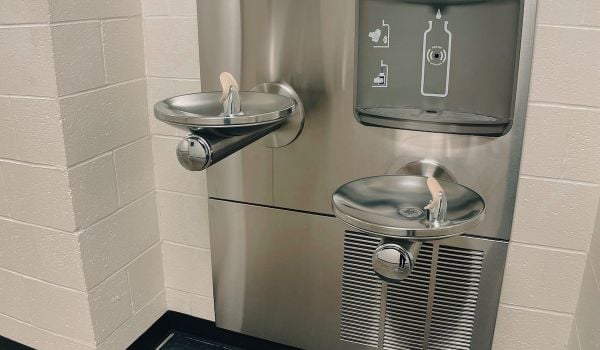Since 2016, Tanaisha Sanders has expanded her Newark, New Jersey business, a childcare learning center called The Institute of Intriguing Minds, from one to four campuses across the region. In all five years, Sanders hasn’t felt comfortable letting the children drink tap water.
Newark’s water crisis took hold just as Sanders started her business, in the form of record-high lead levels in drinking water of schools. In 2017, the city reported lead levels were above the federal action level and in 2018 and 2019, lead levels rose to some of the highest of any major city in the country. “Imagine a kid drinking this water from the time they grow up to their teenage years, knowing how damaging it is and what it can do to their brain development,” she says.
Sanders has to dedicate precious educational space, not to mention significant funding, to an ongoing stock of plastic water bottles. That’s going to change when The Institute of Intriguing Minds secures access to a Water Box, a $50,000 portable filtration system that removes lead and other contaminants to provide 10 gallons of clean water every minute.
By the end of March there will be four Water Boxes across the city, thanks to the advocacy of Newark Water Coalition. The organization, founded in 2018 with the mission to “show up with clean water in Newark where we need to” partnered with the nonprofit 501CTHREE, Newark residents, houses of worship, small businesses and mutual aid networks to provide the resource and get the word out. “To me, it’s all mutual aid — this is the type of intangible mutual aid that people don’t talk about, the skill sharing and community,” says Anthony Diaz, co-founder of Newark Water Coalition. “This is community.”
Since its founding, the Newark Water Coalition has worked to expose the environmental racism at the heart of the city’s water crisis. Their demands have been for the city to replace residents’ water pipes, conduct blood tests for all residents and establish mandatory testing of resident water — all of which are currently being done. Two other demands, to establish a long-term supportive program for victims of lead poisoning and place a moratorium on water utility bills until lead levels reach zero, have not seen action by the city.
Those demands were coupled with an urgent question: How do we distribute as much safe water to residents as possible? Following an EPA ordinance in July 2018 that required the city to distribute bottled water, the coalition began distribution of bottles and gallon jugs in two distribution sites and were planning to open a third.
“When COVID hit, we shut down the distribution centers just out of safety,” says Diaz. The coalition transitioned to no-contact delivery to homes, asking for donations of bottled water at a time grocery stores limited how much customers could buy. “We were getting 75 requests a day to deliver water,” he adds.
Six months prior to the lockdown, Newark Water Coalition began talks with 501CTHREE, a nonprofit that incubated the Water Box in Flint, Michigan. The Water Box was designed as “a bridge solution to when systemic change needs to occur,” says co-founder Drew Fitzgerald. (The other founder is musician Jaden Smith.) Fitzgerald and Smith were drawn to Newark given how deeply connected the Newark Water Coalition was to its community.
COVID didn’t deter the team from moving ahead to install the city’s first Water Box. In the summer of last year, the team held outdoor community meetings to explain the Water Box’s filtration and testing system. Residents simply bring a jug from their home and fill it. The box uses a water line to filter tap water for residents to fill their jugs — eliminating the use of plastic bottles entirely. Testing is an important component — water from the box is tested on site by Newark Water Coalition organizers. (If residents want their home water tested the coalition sends it to a lab; organizers are also working on an on-site testing method.)
“The average public drinking water person doesn’t have any control to see whether their drinking water is good or bad, they have to trust the utility and the leadership,” Fitzgerald notes. “A testing regiment … provides ultimate transparency. The power is in the hands of the people.”
The first Water Box started operating in a Newark church last October, and later moved to a different church — St. Stephen’s, which became the permanent home for the first Water Box. Newark Water Coalition designed a pickup system to ensure social distancing and regular water testing. “We don’t have to pay for it, we don’t have to scrounge our pennies together at Shoprite,” Diaz says of the shift away from purchasing water to distribute. “It’s this self-sufficiency — that’s what the Water Box has allowed us in the service that we do.”
Since March the Newark Water Coalition worked in partnership with mutual aid networks to distribute water, food and supplies to residents during COVID-19; those partnerships continued with the introduction of the Water Box. At St. Stephen’s, Newark Water Coalition is exploring how to expand existing food distribution into a permanent community fridge.
Right before Newark Water Coalition’s two-year anniversary this December, 501CTHREE called Diaz to let him know the nonprofit secured funding for three more boxes. “It was crazy!” Diaz recalls. They launched the second site at Alkaline XPress Holistic Wellness Center in January and plan to launch the next two sites this February and March.
“Each location represents a different level of partnership,” Diaz explains. Newark Water Coalition wanted to work with Alkaline XPress as a Black-owned local business that practices wellness in the community. The Institute of Intriguing Minds, another Black-owned business, emerged as an ideal location because it serves children. “We know that lead poisoning disproportionately affects children under the age of six,” Diaz says.
In these early months of the Water Box, Newark Water Coalition has quadrupled its capacity of filtered water distribution, according to Diaz. With all four Water Boxes in operation, he expects the Newark Water Coalition to distribute 4,000 gallons per month.
When a Water Box arrives at The Institute of Intriguing Minds, Sanders won’t need to replace the cases of bottled water currently stacked along walls of classrooms. The money she’s spent on bottled water will be dedicated to things like hiring staff and purchasing learning materials. And she’ll activate her wide network on social media, as well as the childcare app that connects her to parents, to invite other community members to use the box.
“You don’t want to ever question whether or not the water is safe for your child at an academic center,” she says. “I know that this is going to make a difference in our community.”

Emily Nonko is a social justice and solutions-oriented reporter based in Brooklyn, New York. She covers a range of topics for Next City, including arts and culture, housing, movement building and transit.
Follow Emily .(JavaScript must be enabled to view this email address)











